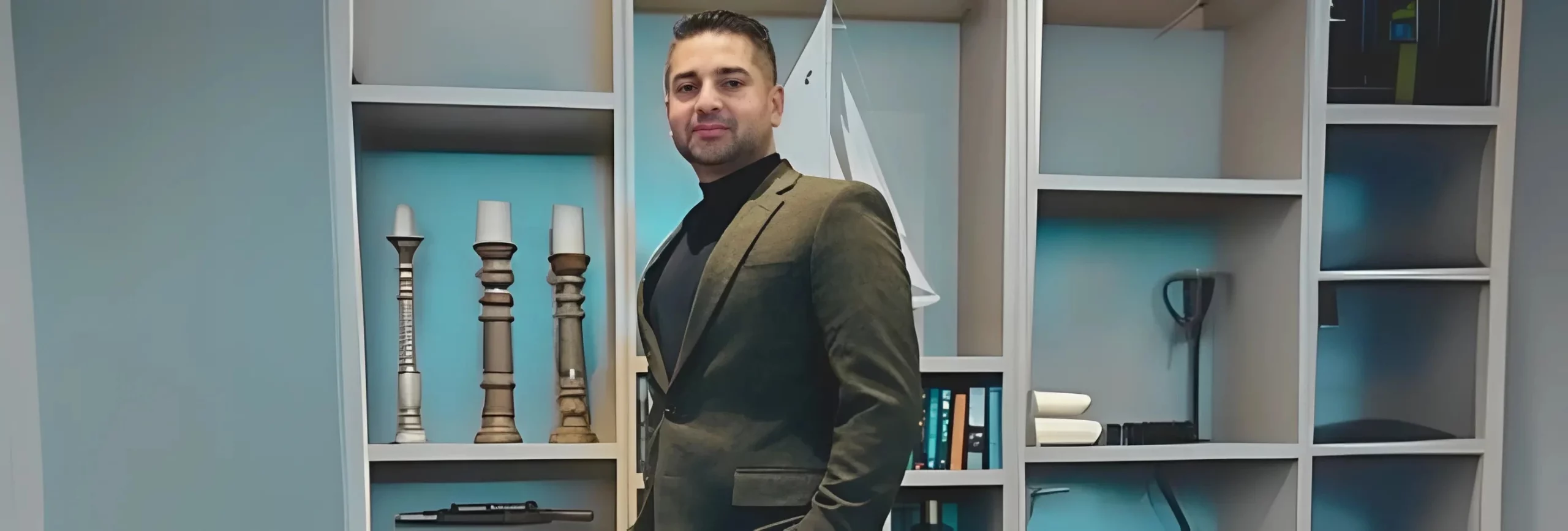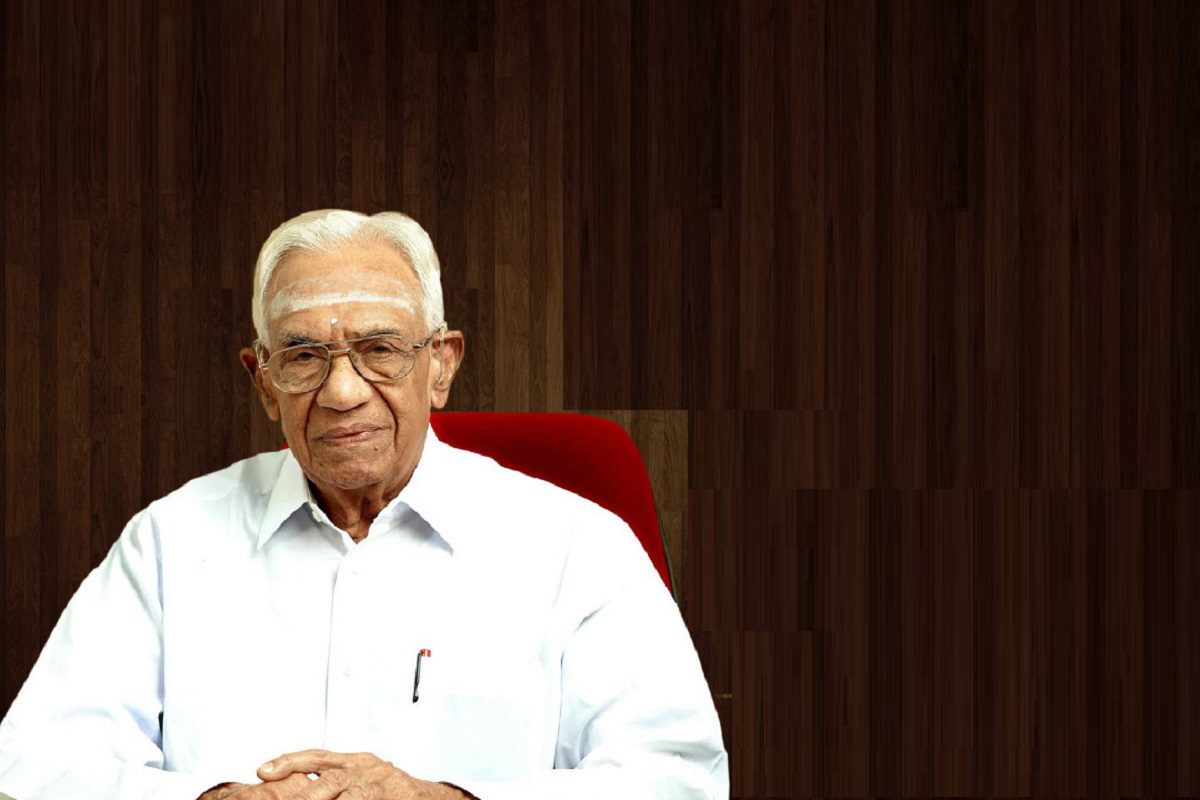(Jun 3, 2025) Karan Chopra didn’t follow a conventional script. Born in Mohali, Punjab in 1982 and now based in Somerset, New Jersey, he is the driving force behind a multi-faceted Ayurveda enterprise that includes The Vedic Store, a holistic Ayurvedic brand, a consultancy wing, and a national distribution arm. What might appear today as a polished Ayurvedic business house had its roots in the vibrant chaos of college dorm rooms and musical rehearsals, where a young Karan was simply trying to share his love for Indian culture with a new world. From importing Dhol drums to delivering ancient healing wisdom across the United States, his story weaves together music, medicine, and multi-generational legacy into a uniquely American dream.
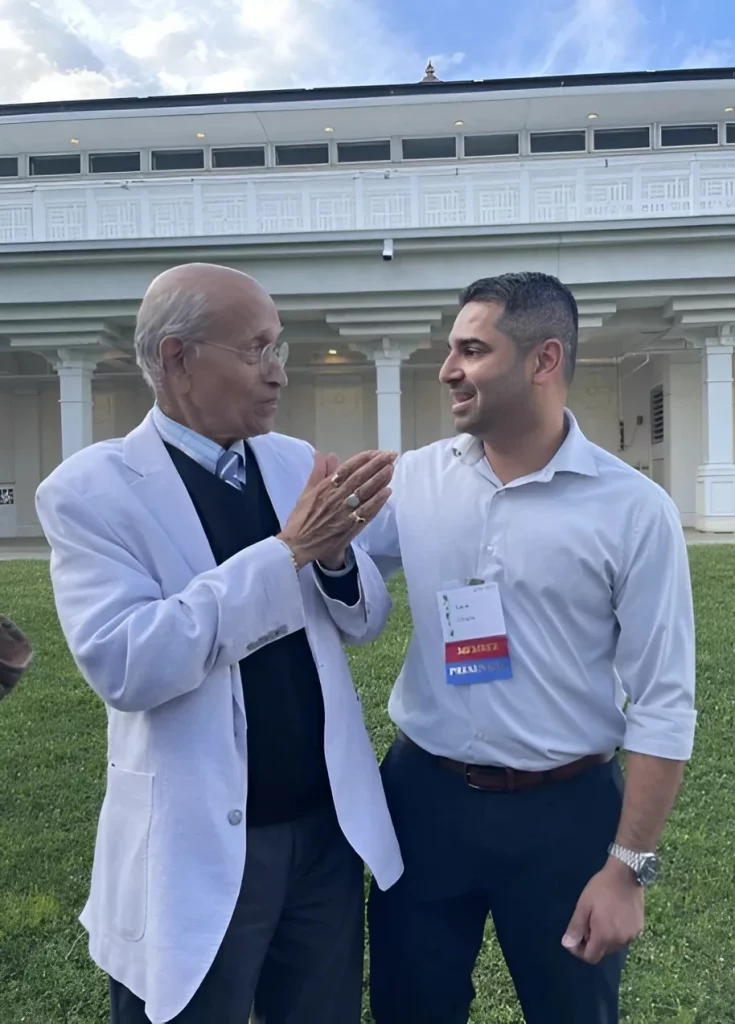
Karan Chopra with Dr Vasant Lad, founder and director of The Ayurvedic Institute in Albuquerque, New Mexico
A young immigrant in the land of ideas
Karan arrived in the U.S. in 1997 as a teenager, while his family remained in India to care for his aging grandmother. It was a leap of faith driven by deep curiosity and a yearning for opportunity. “I was always driven by ideas and the U.S. based on interactions from some neighbours who had moved back after spending years here,” he shares with Global Indian, recalling those early days.”It seemed like the land allowed entrepreneurship and ideas to flourish.”
While most teens his age were adjusting to high school, Karan was already envisioning how to blend his Indian roots with his new surroundings. “I was quite connected both to my Indian and American values,” he explains. “I loved finding out how to reconcile my love for what both cultures had to offer.”
Music as a medium, entrepreneurship as the message
While pursuing a degree in Biotechnology and Informatics at the Rutgers University, Karan’s cultural exploration came alive through music. He co-founded RAAG, a fusion acapella group that brought Bollywood and Western sounds together, and helped launch RUDE, the Rutgers University Dhol Effect. He also performed nationwide with RU Bhangra, the university’s competitive dance team.

Karan Chopra
But what began as creative expression gradually turned into commercial potential. “Through our Dhol band, I had people all over the country asking how they could get their hands on a Dhol themselves,” Karan recalls. Seeing the demand, he and his friends launched an e-commerce website, eventually offering over 50 types of classical Indian instruments. “It was a hobby project that turned into a full-blown flourishing business and taught me imports, warehousing, logistics, ecommerce,” the entrepreneur remarks.
This early success in blending culture and commerce would later serve as a blueprint for his larger venture into wellness and Ayurveda.
A family reunited, and beginning of a new chapter
In 2005, Karan’s family moved to the U.S., and a new chapter unfolded. His father, starting over in a new country in his fifties, noticed something promising, and that was a growing American interest in holistic wellness. “He had an entrepreneurial spirit and a passion for Yoga and Ayurveda,” Karan says. “My father noticed a growing trend in the U.S. towards holistic wellbeing and decided to introduce Ayurveda to the U.S.”
At the time, Karan was working as a pharmaceutical consultant. He was considering business school but instead took a different route. “I took my savings that would have gone towards an MBA and figured I’d get some real-life experience by working with my father in creating a business with him.” This decision led to the formation of what is today Sumitra Remedies LLC, a business built on deep values, mutual respect, and a shared vision.
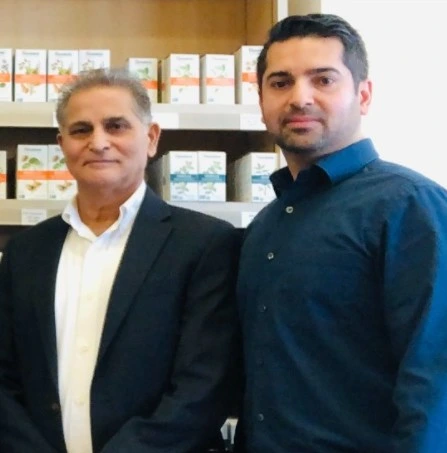
Karan Chopra with his father, Virender Chopra
Scaling up Ayurveda’s reach in the U.S.
What began with names like DivyaOm gradually evolved into Sumitra Remedies LLC, the central entity that now manages multiple verticals. “DivyaOm, Sumitra Remedies and The Vedic Store are all different names that evolved into the same business,” Karan explains. Today, Sumitra Remedies oversees The Vedic Store, its flagship retail and e-commerce operation in Edison, New Jersey, along with an in-house Ayurvedic product line, a distribution wing serving over 1,500 retail stores across the U.S., and a consulting arm that supports companies entering the Ayurvedic market.
In the early years, Karan handled operations which included everything from logistics to warehousing, while his father led the strategic vision. As the business matured, Karan Chopra gradually took over the leadership reins. “It has been an interesting lesson in how Ayurveda is perceived in the U.S., who are the ideal customers, the regulatory challenges and bridging the gap between how Ayurveda functions in India versus how it can exist in the U.S,” he mentions.
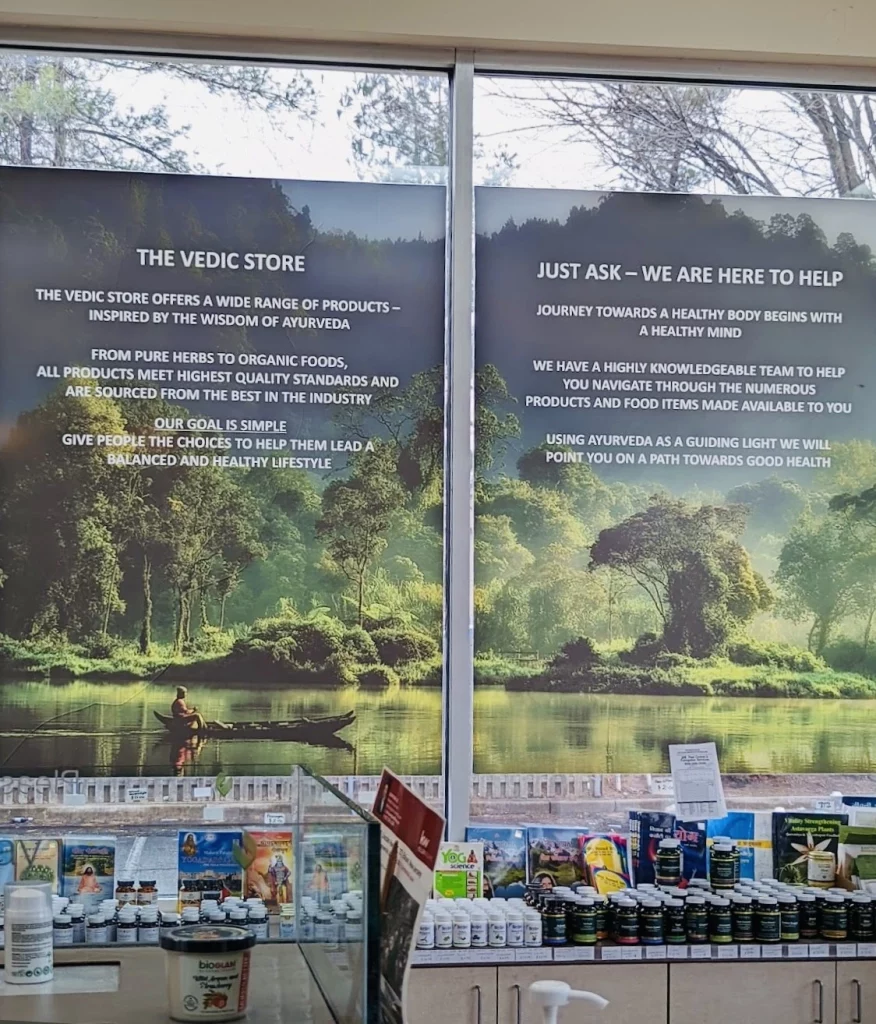
A responsible approach to Ayurveda
What sets Sumitra Remedies apart isn’t just its scale or product diversity. Rather, it’s the company’s commitment to integrity. “Since the beginning, my father’s vision was to promote Ayurveda responsibly and that is our guiding principle behind every strategic decision we take,” Karan says.
That principle is most visible at The Vedic Store, where customers are greeted by full-time Ayurvedic consultants with six-year medical degrees. “Our unique model of providing customers with a full-time resource in the form of trained Ayurvedic consultants serves as a way to responsibly promote Ayurveda,” he explains. “The education component is a way to pass the deeper message of Ayurveda’s holistic nature. Ayurveda is not positioned as a trend, but as a comprehensive wellness system rooted in prevention, balance, and lifelong care.”
Legacy that spans continents
The name Sumitra Remedies carries deep familial significance. “Sumitra was my grandmother’s (father’s mother) name, after whom my father has named our company.” But Ayurveda runs in Karan’s lineage on both sides. His maternal grandfather was an Ayurvedic doctor who opened one of the first Ayurvedic clinics in Mombasa, Kenya in the 1950s.
Karan sees his work today as a continuation of that legacy. With over 15 years of experience in the U.S. market, he is now developing a course for aspiring Ayurvedic entrepreneurs. “I am working on a course to share all this information with budding entrepreneurs to allow them to turn their passion in Ayurveda into a livelihood,” he says. “The U.S. healthcare system is desperately searching for answers and unbeknownst to them Ayurveda has many of the answers. A big challenge right now in the U.S. is that those with knowledge of Ayurveda are not able to make a living from it.”
For Karan, solving this disconnect is personal, and urgent.
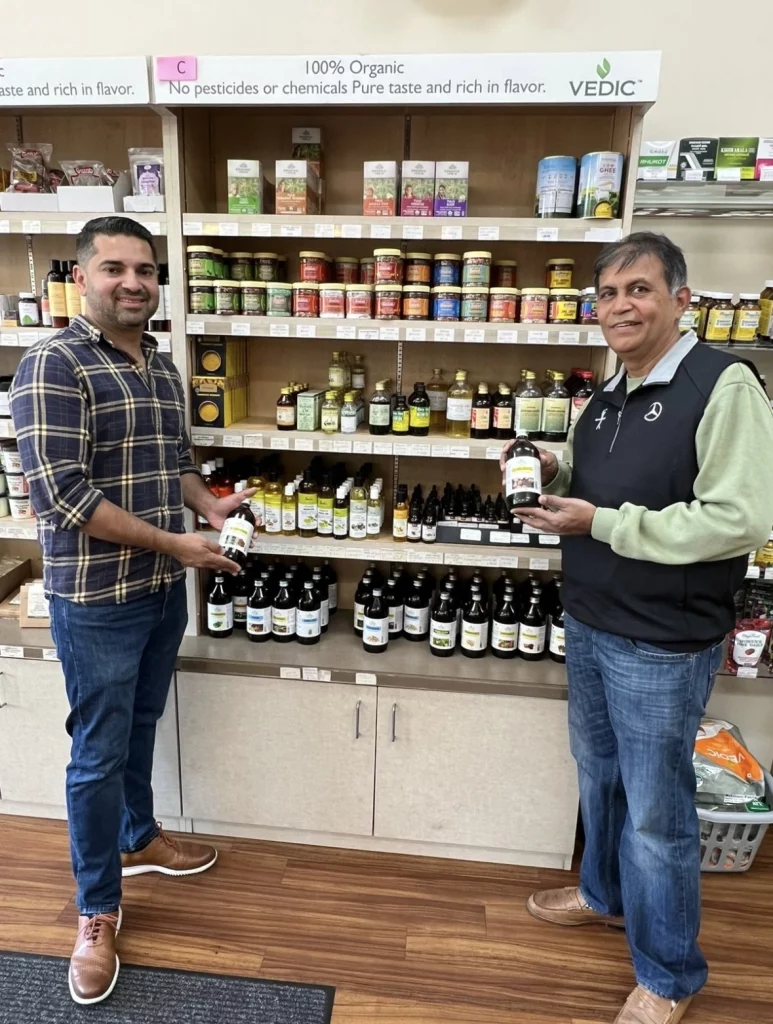
Karan Chopra with Shashank Sandu, Director of Sandu Pharmaceuticals that has been manufacturing Ayurvedic medicines since the last 126 years
The music never left
While Ayurveda became his life’s work, music remains an enduring passion. Karan learned classical Indian music from the age of four until fourteen and taught himself to play multiple instruments. “I developed a knack for self-teaching myself many musical instruments,” he says. His love for the Dhol emerged in college and led to performances with artists like Sukhshinder Shinda, Jazzy B, RDB, and Bikram Singh.
His musical background is more than nostalgia. It reflects a lifelong commitment to learning, improvising, and uniting people through shared experience. That same mindset fuels his business approach today.
A new generation and a renewed purpose
Now a father of two young children, Karan Chopra is thinking about heritage from a new perspective. “I used to travel to India annually for the first 10 years of business but that has slowed down since the COVID pandemic,” he says. “With two young children of my own (who have visited India once so far), I look forward to taking more frequent trips to introduce more about India to them.”
As his children grow, so does his sense of purpose. What began as a desire to share Indian culture with the U.S. has become a mission to make Ayurveda accessible, ethical, and enduring.
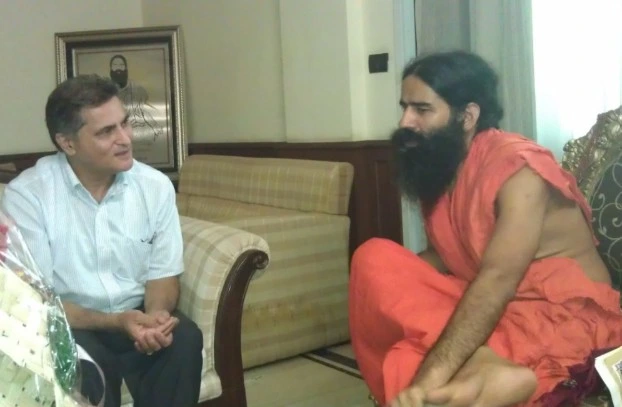
Karan’s father Virender Chopra with Baba Ramdev during a discussion of Patanjali’s launch in the U.S.
The journey continues
Fifteen years after choosing to build a business with his father rather than attend business school, Karan Chopra reflects on the road ahead. “It’s been an amazing journey so far and I feel like I am just getting started with applying all the learnings from him.”
From campus concerts to clinical consultations, from percussion beats to plant-based healing, his path is an ongoing symphony of culture, conviction, and care. In an age of fragmented wellness, he is on the path of proving that ancient wisdom can still strike a resonant chord, if delivered with clarity, compassion, and purpose.
- Follow Karan Chopra on LinkedIn
ALSO READ: Ritika Shah: Bringing Ayurveda to everyday life in India and beyond

